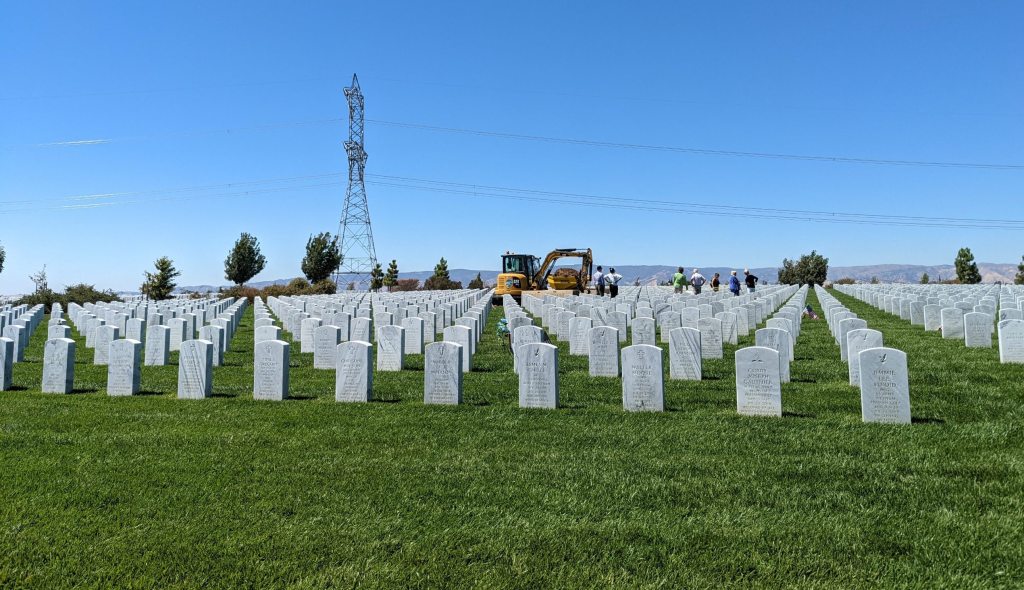
A brief reading at the cemetery for her committal
I’ve been thinking a lot about memory.
After her brain injury in October 2020, I remember sitting with my mother outside on the patio at the house in Vacaville. The most voracious reader I have known, she couldn’t, and could never again, see well enough to read due to visual field cuts. She would never fully regain her balance, and in these early days she was mostly drowsing and not very responsive. With help, we brought her outside and I sat with her in the stillness of this particular autumn afternoon and played audio of the readings of Northern Irish poet Seamus Heaney. I like to think it helped her think of her homeland and Irish family.
Over the following several months she regained an astounding amount of function as family, and many friends old and new, bore loving witness.
While she could not live independently again (and had not wanted to live alone at the house in Vacaville anyway after Dad died), in San Francisco, she did nevertheless have her own place with her own carers, worked very hard with therapists so that she could get her own self around the apartment, and thus did gain some independence for herself. We could visit every day; she enjoyed very good foods and very excellent care; she had a sunny window with a view of the city; and she made new friends.
Despite her constant struggle after that to retain short-term memory, she was always happy to see us. She not only built loving new relationships with carers and our trainer, and even with therapists who perhaps visited only briefly, but she always kept precious the memory of long-time friends, some of whom went to heroics to visit and to constantly keep in touch.
And like a volume of books, she retained the memory of songs and poems from a lifetime ago — from a distant Irish past. She trotted out old Irish songs I had never heard before, and continued to recite poems from far and wide, as if not being able to read was not important, because the words were etched with permanence inside her mind.
Although her dad, Grandpa Norman, taught me to memorize the alphabet backwards, I have never been as talented at reciting poetry as Mom and Grandpa. But I thought if I could remember a poem like she could remember a poem, I could keep her.
So I memorized this poem, and read it at the cemetery:
And some time make the time to drive out west
Postscript by Seamus Heaney
Into County Clare, along the Flaggy Shore,
In September or October, when the wind
And the light are working off each other
So that the ocean on one side is wild
With foam and glitter, and inland among stones
The surface of a slate-grey lake is lit
By the earthed lightning of a flock of swans,
Their feathers roughed and ruffling, white on white,
Their fully grown headstrong-looking heads
Tucked or cresting or busy underwater.
Useless to think you’ll park and capture it
More thoroughly. You are neither here nor there,
A hurry through which known and strange things pass
As big soft buffetings come at the car sideways
And catch the heart off guard and blow it open.
It strikes me that this poem is breathtaking because it describes a moment that can never be captured or relived, which is, of course, what makes it precious. On the other hand, memory — especially in the short term — can be so fickle. When you have that one moment of the present, you can’t turn around to drive back to get it again. I am happy I got to say “I love you more” a million more times to my mother, but I can’t say it that one more time.
I was able to recite the poem from memory. But I was still unable to keep my mother.
After he died, a fellow poet said of Seamus Heaney: “His work will pass into permanence.” So maybe memory isn’t exactly the way I will get to keep her.
I will breathe in deep breaths, and when I release them, maybe each time I will allow a little more of my mom to pass into permanence in my heart. And I will know that she is there not in the keeping, but in the release, during every countless random hurry when the wind and the light catch it off guard and blow it open.

